Over the past few years, there’s been plenty of insight (and conjecture) as to what sets product managers apart from product leaders. There’s a fascinating discussion on Quora that highlights many widely agreed-upon best practices for product leadership. But we decided to follow one of those best practices and actually look at our data to substantiate claims and determine how product leaders move up the ladder. Consulting our survey of more than 150 product managers and interviews with over 200 experts on our podcast, This is Product Management, we gained some surprising insights.
To conduct the analysis, we split survey respondents into two roughly equally-sized groups of product managers and senior product leaders within the product department. We then looked at the responsibilities that each group reported having in their day-to-day jobs.
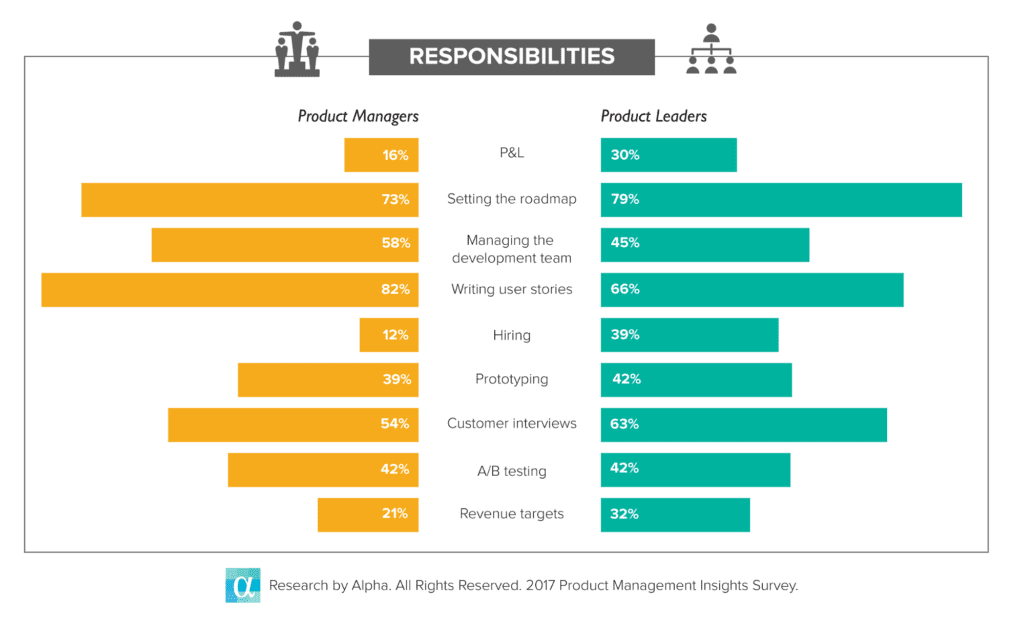
Unsurprisingly, we found that product leaders are overall more likely to be responsible for P&Ls, hiring, and revenue targets. Product leadership requires strategic thinking and strong communication skills. Meanwhile, product managers are more likely to manage the development team and write user stories. They need to have the practical skills that are required for the day to day work of developing products and features.
We dug further into tour data to try to identify correlations that could lead us to how someone earns a product leadership role in the first place. While practical skills are important, they seem to matter far less important than the ability to learn, solve problems, and simply being in the right place at the right time. This articles covers the education, experience, and skills, that it takes to rise to a product leadership role.
Do product leaders need a graduate degree?
Education level seemed like an obvious place to start our analysis. Our annual Product Management Insights report shows that overall, product managers are an impressively educated bunch. According to the U.S. Census Bureau, as of 2012, roughly 11% of people over the age of 25 held graduate degrees. Compare that to the 46% of those in product management with graduate degrees.
But is education level the reason why a product manager gets promoted? On the surface, it appears not. In fact, product managers are slightly more likely to have graduate degrees than their superiors.
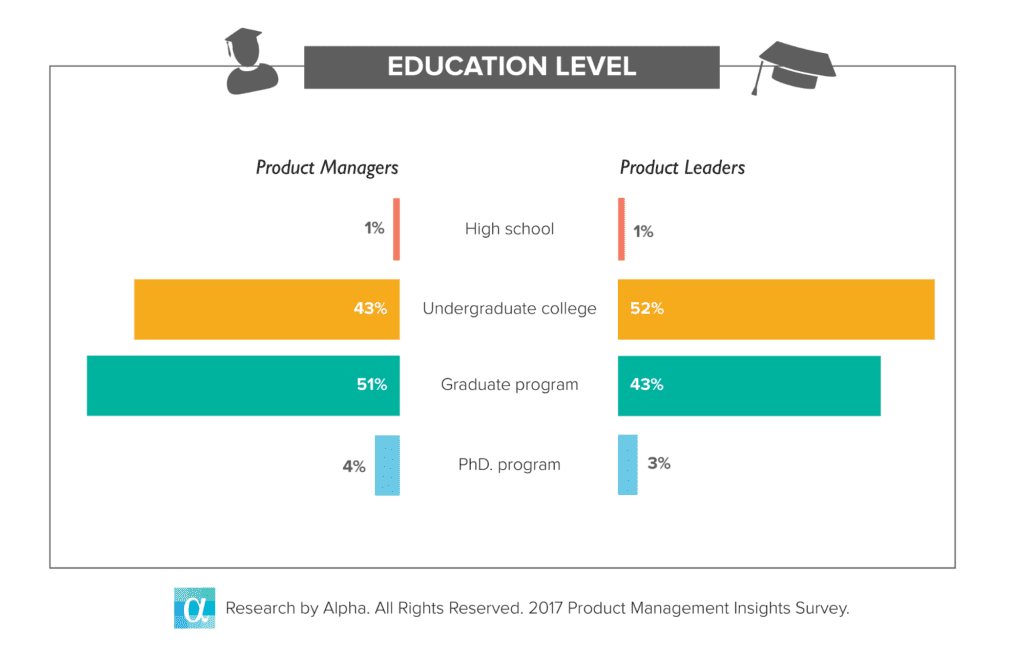
An MBA, for example, can provide a strong business acumen and be indicative of a strong work ethic, but product is a new and fast-moving field. The skills that are required are often best learned on the job – even if that job is not a product management job.
What experience is required for product leadership?
We moved from education onto background, considering if roles held earlier in one’s career serve as the foundations of future success in product leadership. Anecdotally, we were skeptical that specific experience was required, as numerous product leaders I’ve interviewed on This is Product Management landed in their roles from hardly related fields.
For example, Teena Singh, Director of User Experience at ADP, began her career in human resources. Brent Tworetzky, Executive Vice President of Product at XO Group, began his career in management consulting. And Dan Blumberg, Product Director for New York Times Global, was previously a radio show host and producer. Their backgrounds are drastically different, but they all clearly have the skills to be successful in product leadership.
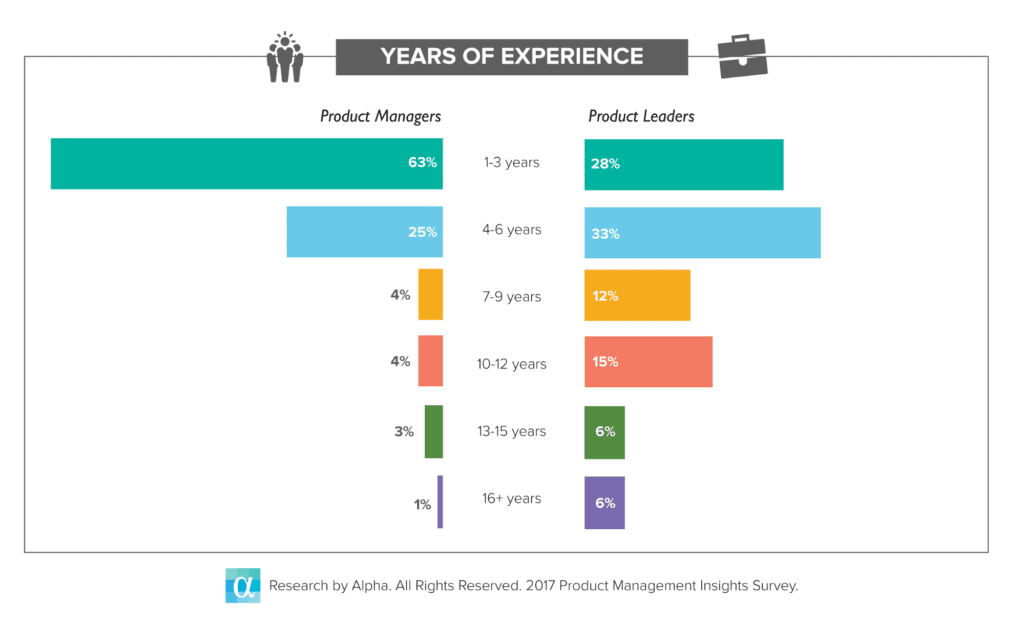
The data confirmed our skepticism. Product leaders aren’t any more likely to come from one background as opposed to another. This may be because product management is still a relatively new field, so no one really has a lot of product management experience, or because the skills required to be successful in the field can be gained from a variety of experiences. For example, you can learn how to manage people, make data-driven decisions, and ship on time in a variety of role. However, I wouldn’t exclude the possibility that domain expertise can play a critical part in landing a leadership role in an industry vertical-focused organization. It's critical for product leaders to understand the problem that they're solving and the market that they're working in and have empathy for their customers.
What challenges do product leaders need to overcome?
Thus far, we're 0 for 2. So we went a step further and explored whether product leaders report having the ability to overcome challenges that inhibit their subordinates from advancing in their careers. While there are no breathtaking differences between the two groups, product leaders are slightly less likely than product managers to say that they are most challenged by internal politics.
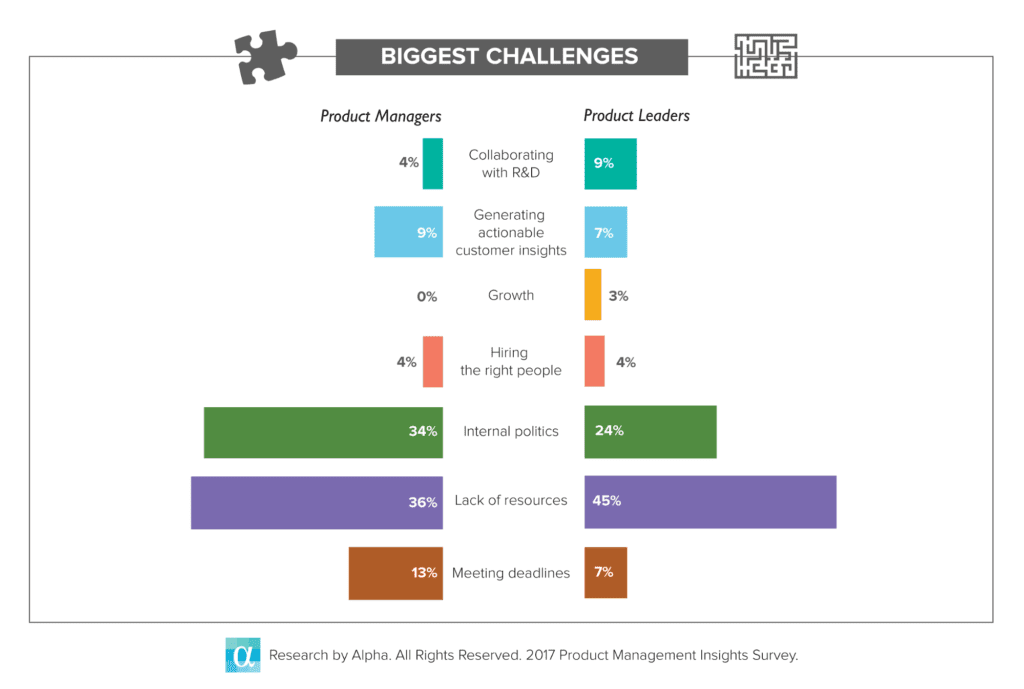
Product leaders need to be able to work with a number of internal stakeholders. Launching new products and features is a true team effort. It requires working across function teams such as marketing, engineering, research, and executive leadership.
In an episode of This is Product Management, titled "Transferring Excitement,"Joe Lalley, Experience Design Leader at PwC, shares his best techniques for collaborating with key stakeholders. He recommends thinking critically about the questions that stakeholders are likely ask and practicing responding. Joe also suggests bringing to meetings “anything that is really real and tangible, that somebody else can connect to, to feel the feeling that they have.”
Product leaders were also less likely that product managers to report "meeting deadlines" as being their most significant challenge.
What do product leaders wish for?
Moving from biggest challenge to biggest wish, we again found little difference between product leaders and product managers. This was perhaps the most surprising insight of all because we expected that product leaders would at least be less likely to wish for a clear product roadmap and strategy, given that they presumably have more authority to set it.
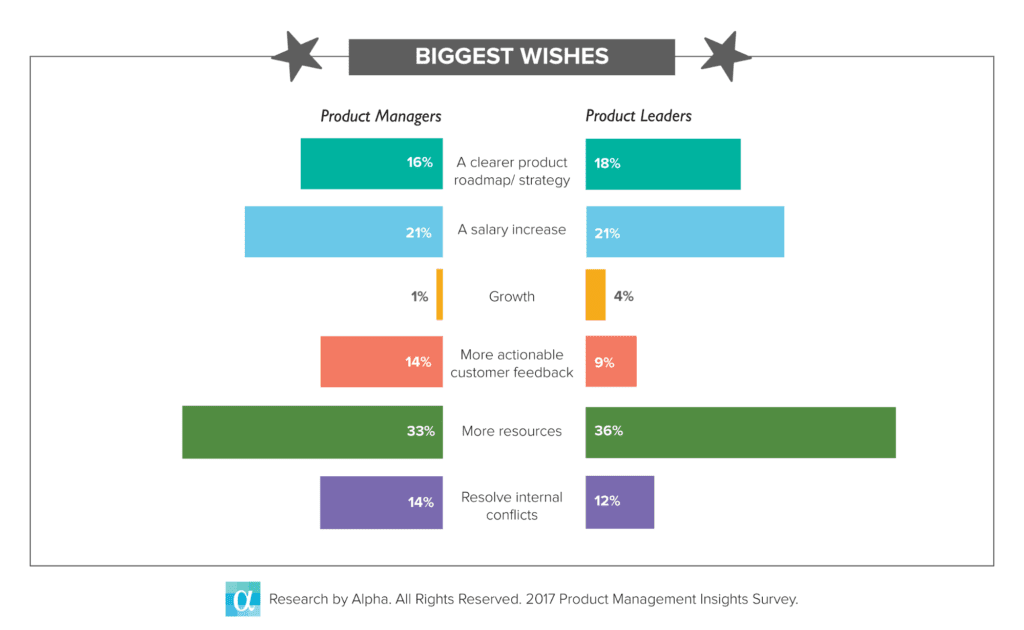
Learning is essential in product leadership
We cut the data in a number of other ways, but by now you’re probably getting the point. We could find absolutely nothing noteworthy that product leaders ‘did’ that product managers ‘did not.’ Product leaders weren’t more likely to know how to code, write data queries, talk to customers, or do any of the myriad of best practices we commonly associate with excellence in the discipline. And that in and of itself is the takeaway: there’s no specific skill that elevates a product manager aside from simply learning on the job in the first place. Indeed, the only indicator of whether someone is a product leader is the number of years of experience they have in product management.
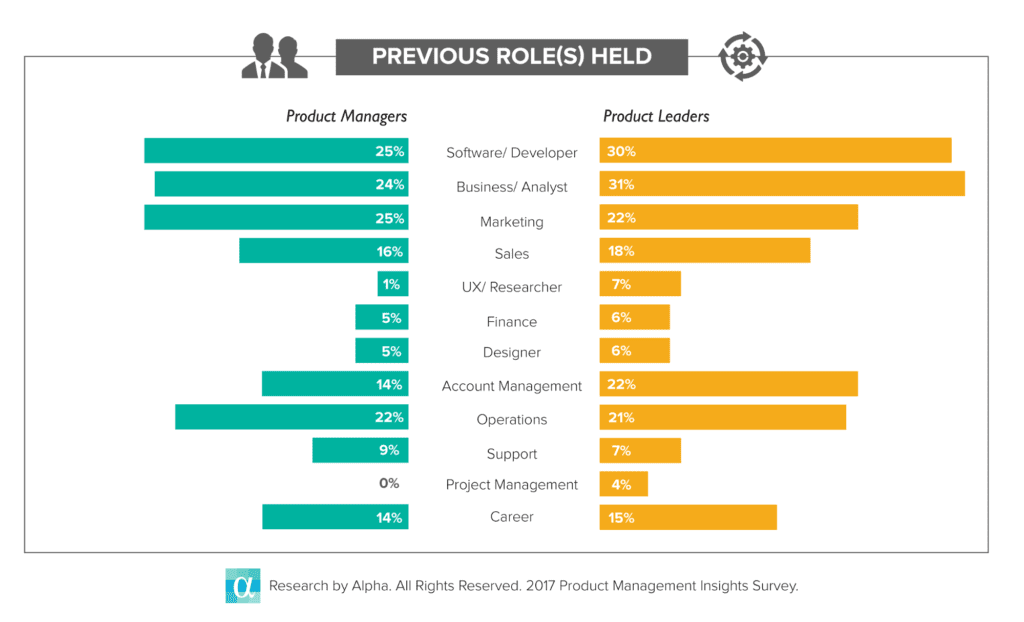
One thing I’ve certainly learned from all the product leaders that I’ve interviewed is how seriously they take hiring and mentoring. Perhaps they model the product managers that they manage in their own image, which is why there isn’t an obvious measurable difference between the two groups. After all, there isn't a an industry standard training curriculum or education track.
To that end, the key to becoming a product leader is to first become a product manager. And, besides a little bit of luck to get there, that means studying what skills and knowledge companies are looking for and why. When I interviewed Jon Stross, Co-Founder of Greenhouse, he explained how he prefers to hire product managers from within his customer support team because they’ve already developed empathy for the company’s customers. Similarly, David Cancel, Founder of Drift, prefers to hire people from his company's human resources, sales, and finance teams because they already understand the business and market.
While the day-to-day responsibilities of a product manager vary widely from company to company, persistence and an uncompromising desire to learn are always critical. Virtually every product leader I’ve interviewed has hit a wall (if not many) at some point throughout his or her career. But all that matters is that they got back up and were stronger because of it. And while following best practices certainly help, time and experience are the most critical factors to becoming a product leader.

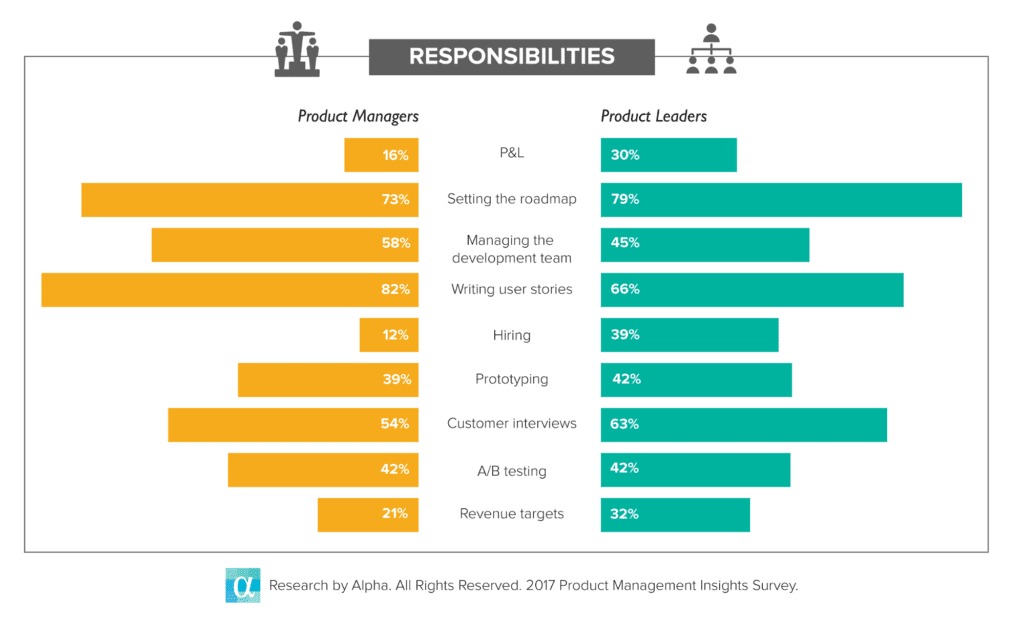

.jpg?width=352&name=Web_Header_1000x666%20(1).jpg)
